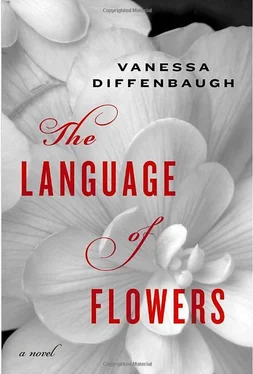Renata pulled up, unlocked the passenger door, and motioned for me to get inside. I sat as far away from her as possible, and when I slammed the door it rattled against my fleshless hip.
“Good morning,” said Renata. “You’re on time.” She U-turned and drove down the empty street the way she had come.
“Too early to wish me a good morning?” she asked. I nodded, rubbing my eyes, pretending I’d just awakened. We drove in silence around a roundabout. Renata missed her turn and went around twice. “It’s a little early for me, too, I guess.”
She drove up and down the one-way streets south of Market until she pulled in to a crowded parking lot.
“Follow close,” she said, getting out of the truck and handing me a stack of empty buckets. “It’s crowded in there, and I don’t have time to waste looking for you. I have a two o’clock wedding today; the flowers have to be delivered by ten. Luckily, they’re just sunflowers—won’t take long to arrange.”
“Sunflowers?” I asked, surprised. False riches. It wouldn’t be my wedding flower of choice , I thought, and then rolled my eyes at the absurdity of the words my wedding .
“Out of season, I know,” she said. “You can get anything—anytime—at the flower market, and when couples throw money at me, I don’t complain.” She shoved her way through the crowded entry. I followed close behind, cringing as buckets and elbows and shoulders brushed my body.
The inside of the flower market was like a cave, hollow and windowless, with a metal ceiling and cement floor. The unnaturalness of the sea of flowers within, far from soil and light, set me on edge. Booths overflowed with seasonal flowers, everything blooming in my own garden but cut and displayed in bunches. Other vendors sold tropical flowers, orchids and hibiscus and exotic plants I couldn’t name, from hothouses hundreds of miles away. I plucked a passionflower and tucked it in my waistband as we rushed past.
Renata flipped through sunflowers as if they were pages of a book. She argued over prices, walked away, and returned. I wondered if she had always been an American, or if she had been raised in a place in which bargaining was a way of life. She had a trace of an accent I couldn’t place. Other people walked up, handed wads of cash and credit cards, and left with their buckets of flowers. But Renata kept arguing. The vendors appeared to be used to her, and argued only halfheartedly. They seemed to know that in the end she would win, and in the end she did. She stuffed bundles of orange sunflowers with two-foot stems in my buckets and raced to the next booth.
When I caught up with her, she held dozens of dripping calla lilies, tightly rolled petals of pink and orange. The water from the stems soaked though the thin sleeves of her cotton blouse, and she threw the flowers in my direction as I approached. Only half landed in the empty bucket; I folded over slowly to gather the fallen flowers.
“This is her first day,” Renata said to the vendor. “She doesn’t yet understand the urgency. Your lilies will be gone in another fifteen minutes.”
I slid the last flower into the bucket and stood up. The vendor was selling dozens of varieties of lilies: tiger, stargazer, imperial, and pure white Casablancas. I brushed a bead of pollen from where it had fallen on the petal of an open stargazer, listening as Renata negotiated the price of her purchases. She was spewing numbers far below what the surrounding customers had paid, barely pausing for a response, and stopped suddenly when the vendor agreed. I looked up.
Renata pulled out her purse and waved a thin stack of bills in front of the vendor’s face, but he didn’t reach for them. He was looking at me. His eyes traveled from the top of my stiff hair down my face, flitting around my collarbone and heating my covered arms before resting on the sticky brown pollen on my fingertips. His gaze felt like an invasion. I squeezed the lip of the bucket I held, my knuckles white.
Renata’s hand jutted into the still quiet, her cash flapping impatiently. “Excuse me?”
He reached out to grab the money but did not pause in his bold exploration of my body. Continuing down my layers of skirt, he studied the stripe of leg visible between my socks and stretch pants.
“This is Victoria,” Renata said, flicking her fingertips in my direction. She paused, as if waiting for the flower farmer to introduce himself, but he didn’t.
His eyes snapped back to my face. Our eyes met. There was something unsettling in them—a flicker of recognition—that captured my attention. Looking him over, my first impression was of a man that had struggled as much as, if differently than, I had. He was older than me, I decided—five years, at least. His face had the dusty, lined look of a manual laborer. I imagined he had planted, tended, and harvested his flowers himself. His body was lean and muscular as a result, and he neither flinched nor smiled as I examined him. His olive skin would be salty. The thought caused my heart to race from something besides anger, an emotion I didn’t recognize but which made the core of my body warm. I bit the inside of my lip and pulled my eyes back to his face.
He withdrew a single orange tiger lily from a bucket.
“Take one,” he said, handing it to me.
“No,” I said. “I don’t like lilies.” And I’m no queen , I thought.
“You should,” he said. “They suit you.”
“How do you know what suits me?” Without thinking, I snapped the head of the lily he held. Six pointed petals fell, the flower’s face examining the hard floor. Renata sucked in her breath.
“I don’t,” he said.
“I didn’t think so.” I rocked the full bucket of flowers I carried, dispersing the heat radiating from my body. The motion drew attention to my shaking arms.
I turned to Renata. “Outside,” she said, motioning toward the front of the building. I waited for her to say more, sinking with dread at the thought of being fired on the spot less than an hour after starting my first job. But Renata’s eyes were fixed on the growing line at the next booth. When she glanced back and saw me unmoving, her eyebrows pinched together in confusion.
“What?” she asked. “Go wait by the truck.”
Pushing through a thick crowd, I made my way toward the exit. My arms strained under the weight of the full bucket, but I carried it through the parking lot without stopping to rest. At Renata’s truck I set the bucket down, sinking, exhausted, onto the hard concrete.
From behind the darkwindows, Elizabeth watched. I was sure of it, even though I couldn’t see the outline of her body behind the glass. The back door remained locked. Shivering, I watched the sun drop out of sight. I would have ten minutes, no more, before I was left to root for the spoon in darkness.
I’d been locked out before. The first time I was five years old, my protruding stomach empty in a house with too many children and too many bottles of beer. Sitting on the kitchen floor, I had watched a tiny white Chihuahua eat her dinner from a ceramic bowl. I inched closer, overcome by jealousy. It was not my intention to eat the dog’s food, but when my foster father saw me, my face only centimeters from the bowl, he picked me up by the back of my turtleneck and threw me out. Act like an animal, be treated like an animal , he’d said. Pressing my body against the sliding glass door, I’d absorbed the heat of the house and watched the family prepare for bed, never imagining they’d leave me there all night. But they did. My body quivered, cold and afraid, and I kept thinking about the way the little dog shook when she was scared, her triangular ears vibrating. My foster mother sneaked downstairs in the middle of the night and tossed a blanket through a high kitchen window, but she did not open the door until morning.
Читать дальше












